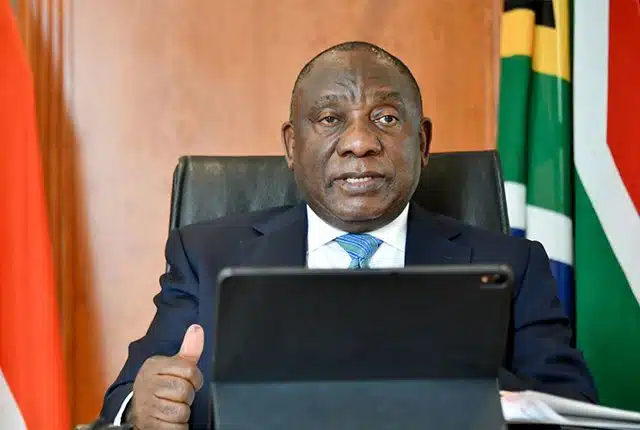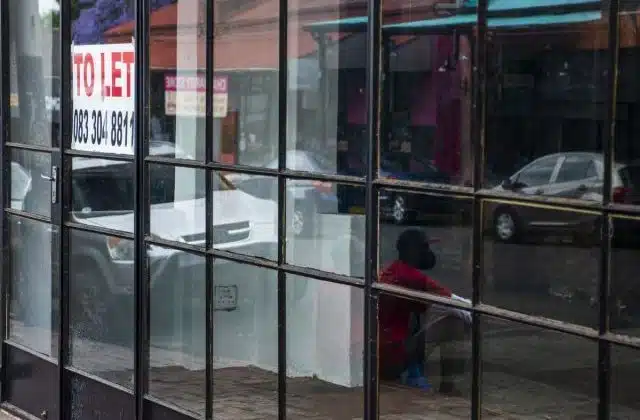
Ramaphosa on lifting South Africa’s national state of disaster
President Cyril Ramaphosa says South Africa will need to meet certain requirements before the country’s state of disaster regulations can be lifted.
The president said that the state of disaster will only be lifted if the appropriate Covid-19 prevention regulations are in place in each sector outside of the Disaster Management Act – or if the Covid-19 pandemic ends, removing the necessity of the regulations.
Responding in a written parliamentary Q&A this week, the president said that all organs of state must develop sustainable regulatory measures for the control of Covid-19 beyond the state of disaster.
“Measures must be infused into policies and regulations to normalise Covid-19 preventative measures in the society. The current measures contained in the regulations for dealing with the disaster in the context of the risk-adjusted strategy remain necessary to limit the negative impact of the Covid-19 pandemic,” he said.
In his own words, Ramaphosa said the state of disaster will end:
- Once sustainable sectoral regulatory measures for Covid-19 response are in place; or
- The need to invoke current extraordinary measures provided for under the state of disaster ceases, all the regulations and directions issued under the national state of disaster will cease to exist.
The president said that ongoing assessments by the National Coronavirus Command Council and Cabinet will determine the satisfaction of conditions for terminating or allowing the state of disaster to lapse.
On Sunday (12 September), Cooperative Governance and Traditional Affairs (Cogta) minister Nkosazana Dlamini-Zuma gazetted an extension of the national state of disaster, which will see it continue until 15 October 2021.
The government declared a national state of disaster under Section 27(1) and Section 27(2) of the Disaster Management Act on 15 March 2020 in response to the coronavirus pandemic.
While the national state of disaster was originally set to lapse on 15 June 2020, the act provides that it can be extended by the Cooperative Governance and Traditional Affairs minister by notice in the gazette for one month at a time before it lapses.
South Africa has been in a state of disaster for 18 months (March 2020 to September 2021), with the latest extension being the 16th from Dlamini-Zuma.
The government has relied on the regulations to introduce and give effect to lockdown restrictions, which it has used to curb the spread of the Covid-19 pandemic.
However, it has also faced criticism for giving national government wide-ranging powers over the lives of citizens, with almost no limits and little to no oversight from parliament.
Never-ending
Business interest group Sakeliga has now lodged a court application to compel the government to disclose its grounds for the state of disaster, disaster management regulations and lockdown levels.
The court application forms part of a process, in terms of the Promotion of Access to Information Act, to obtain Nkosazana Dlamini-Zuma’s records of decision-making regarding the lockdown and all disaster management regulations, Sakeliga said.
“The goalposts for when the restriction must be lifted are constantly shifting. President Cyril Ramaphosa’s point of view this past Sunday, that the restrictions will continue until an acceptable number of people have been vaccinated, contradicts the earlier rationale that restrictions are a temporary step and is only intended to flatten waves of infection,” said Piet le Roux, chief executive of Sakeliga.
“This previous standard, as well as hospital capacity and the number of deaths, are now inexplicably shifting to the background. The shifting of goalposts, without transparency, is detrimental to the social, economic and constitutional order.”
Sakeliga intends to disclose the information obtained through this process for the consideration of civil society and the general public, le Roux said.
Concrete plan needed
Western Cape premier Alan Winde has also raised concerns about the country’s current regulations and what seems to be a never-ending national state of disaster.
“I am concerned that president Cyril Ramaphosa did not present a concrete plan on when he will end the national state of disaster. Instead, the disaster was extended for another month by the minister of Cooperative Governance and Traditional Affairs,” said Winde.
“The hard truth is that we cannot be in this state of disaster forever, and we need to have a frank discussion on how we will continue to manage Covid-19 in the future without relying on this extreme instrument.”
The Western Cape premier said that the government must introduce a new, differentiated management system that considers each province’s coping capacity.
“We have learnt how to manage waves effectively in the province, and we continue to have the capacity to do so at the provincial level. I will be engaging with the president on this important matter during the national lekgotla this week, where all nine premiers will be present.”
*First appeared in BusinessTech



